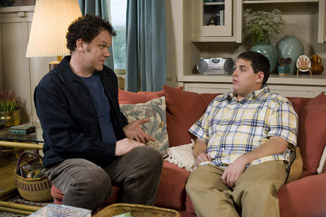|
|
Make An ArgumentMumblecore Is PureBy Eric HughesJune 29, 2011
Hannah Takes the Stairs, actually, isn’t about much of anything. And that’s the beauty of it. Some criticized the lack of plot. I, after some thought, applauded the lack of one. Hannah defied what we come to expect from movies when its stripped-down storytelling failed to appoint a bad guy or another typical convention. It’s a movie about the fluidity of relationships. And that, I guess, is really it. While these movies seem to mostly concern themselves with being uber real – cheap filmmaking equipment, cinema verite, actors with little to no visibility in Hollywood, etc. etc. – it’s interesting to me that rarely does mumblecore augment its realism by making off-handed references to true-life settings. Hannah Takes the Stairs, as I said, is set in Chicago, but it very well could have been filmed in another major city. I don’t remember a single shot in the movie that captured enough street intersection or skyline to be a recognizable chunk of the Windy City. Even more, I heard just one spoken reference to a real Chicago establishment – it so happened to be one of my favorite music clubs, The Empty Bottle! – before the movie was done. Why mention the Bottle at all if only to tease Chicagoans into thinking their mental maps of Illinois’ biggest city would actually come in handy here? It was frustrating. Anyway, some time has passed since mumblecore’s inception, and already the genre has anointed the industry with a handful of names. I’m mostly thinking about actress Greta Gerwig and filmmakers (slash brothers) Mark and Jay Duplass. Gerwig’s big break came in the form of Greenberg, which had her playing female lead opposite Ben Stiller. As for the Duplasses, they were the men behind Cyrus, the indie dramedy with John C. Reilly, Jonah Hill and Marisa Tomei that some people said was “mumblecore enough” to qualify as a piece of the movement. I don’t know, though. Cyrus’ mainstream names and $7 million budget seem to suggest something else. Tracking where these three go, though, may make for another offbeat hobby of mine. Were Greenberg and Cyrus preludes to more mainstream careers, or mere distractions for the young ones as they recharged their mumblecore batteries? Better yet, what will become of mumblecore if a trio of its influentials leaves the movement outright?
|

|
|
|

|
Friday, November 1, 2024
© 2024 Box Office Prophets, a division of One Of Us, Inc.


